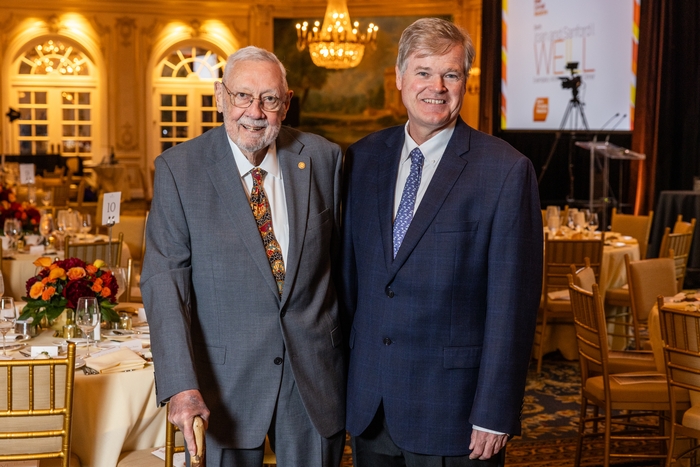Dr. Warren Johnson, a professor emeritus of medicine and founding director of Weill Cornell Medicine’s Center for Global Health, has been awarded the institution’s Joan and Sanford I. Weill Exemplary Achievement Award.
Weill Cornell Medicine established the Weill Award in 2018 in honor of the institution’s preeminent benefactors, Joan and Sanford I. Weill, and to celebrate the 20th anniversary of the institution’s renaming. The award, which carries a $50,000 cash prize, is presented to an exceptional faculty member whose transformational work enhances health care worldwide. Dr. Johnson, who has dedicated more than 60 years to Weill Cornell Medicine, accepted his award June 3 at a gala held in his honor.
“This recognition comes as a complete shock to me, and I’m very honored,” said Dr. Johnson, who retired in January.
Dr. Johnson is an esteemed champion of global health who during his distinguished career at Weill Cornell established outstanding research and training programs around the world, including in Brazil, Haiti and Tanzania. While leading these global programs he also served as chief of the Division of International Medicine from 1986-1995, and chief of the Division of International Medicine and Infectious Disease from 1995-2008. In 2009, Dr. Johnson was named the founding director of Weill Cornell Medicine’s newly established Center for Global Health, which unified and expanded the institution’s global health initiatives, which span six continents

Dr. Warren Johnson, left, with Dr. Daniel Fitzgerald. Credit: Studio Brooke
A committed advocate of mentorship, Dr. Johnson has mentored more than 70 physicians and physician-scientists, including Dr. Daniel Fitzgerald, who in 2017 succeeded him as center director.
“At the root of his life's mission, Dr. Johnson steadfastly believes that health care in the developing world demands the clinical brilliance and scientific rigor that only academic medicine can provide,” said Dr. Robert A. Harrington, the Stephen and Suzanne Weiss Dean of Weill Cornell Medicine. “Dr. Johnson’s decades-long achievements continue to impact global health care today. He is a true visionary and leader in academic medicine and international health.”
As a child growing up on a farm in northern Illinois, Dr. Johnson first imagined a career as a veterinarian. The very idea of medicine was an abstraction until his undergraduate studies at Carroll University in Waukesha, Wis. Then, while a medical student at Columbia University Vagelos College of Physicians and Surgeons, he got the opportunity to work at a mission hospital in Liberia—his first exposure to global health.
“I think that whetted my appetite,” Dr. Johnson said. “I saw a bit what life was like and what one could do, and what one also could not do, due to the lack of resources, personnel and staff.”
That passion for helping others in resource-poor countries sent him to Brazil in 1969, after completing a residency in internal medicine at NewYork-Presbyterian/Weill Cornell Medical Center and a fellowship in infectious diseases at Weill Cornell Medicine, with a two-year stint as an internist for the U.S. Air Force in between. In Brazil, Dr. Johnson forged a collaboration with the Federal University Bahia to conduct high-impact tropical infectious disease research and foster the educational exchange of faculty, fellows and students.
Between trips to Brazil, Dr. Johnson served as an infectious disease physician at Weill Cornell Medicine while teaching aspiring medical students. Dr. Johnson recalled one student, Dr. Jean “Bill” Pape, asking him to be his advisor, even though he was relatively early in his career. A native of Haiti, Dr. Pape was committed to bringing his medical training back to the Caribbean nation to improve the health and lives of the island’s citizens. Dr. Johnson mentored Dr. Pape throughout this medical education and fellowship, and was instrumental in Dr. Pape’s founding of GHESKIO in 1982 in Port-au-Prince, Haiti.
GHESKIO, or the Haitian Study Group on Opportunistic Infection and Kaposi’s Sarcoma, is believed to be the world’s oldest clinic dedicated to treating, studying and preventing HIV/AIDS. Dr. Johnson and Dr. Pape, GHESKIO’s director, the Howard and Carol Holtzmann Professor in Clinical Medicine at Weill Cornell Medicine and inaugural Weill Award winner, were among the first scientists to document the emergence of HIV/AIDS in Haiti. They also observed that people in Haiti with AIDS were more likely to develop secondary conditions such as diarrhea and tuberculosis than patients in the West, which led to more effective treatments and interventions in underserved global communities. And, working with then-President George W. Bush, Drs. Johnson and Pape helped launch the United States’ signature HIV/AIDS global initiative Presidential Emergency Plan for AIDS Relief, known as PEPFAR, in Haiti.
Today GHESKIO is a comprehensive community health center for Port-au-Prince that provides myriad health services free of cost. It also boasts a robust, National Institutes of Health-funded research enterprise.
“The people I’ve been fortunate enough to be associated with, they’re outstanding and committed, with similar philosophies to mine,” Dr. Johnson said. “You have to build, train people and then get support to keep it going.”
That philosophy helped Weill Cornell Medicine establish a formal affiliation with Bugando Medical Centre and Weill Bugando School of Medicine in Mwanza, Tanzania. The school, named in recognition of the Weills' support, last year graduated its 2,000th doctor, who are empowered to deliver the best patient care, despite a resource-limited setting. This unique educational partnership has spurred new possibilities for cultural and medical exchange.
None of these programs would be the success they are today, Dr. Johnson said, if not for the community partnerships he and his team forged in these countries and the impact they have locally.
“If the people on the ground don't really feel that it's theirs, that it's improving things there, then you don't have a sustainable program,” Dr. Johnson said. “It's when the people who are most involved take ownership, then you can work with them and develop things far beyond what you ever thought was possible.”
